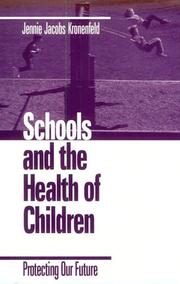| Listing 1 - 10 of 95 | << page >> |
Sort by
|
Book
ISBN: 9781629480077 162948007X 9781629480060 1629480061 Year: 2013 Publisher: New York
Abstract | Keywords | Export | Availability | Bookmark
 Loading...
Loading...Choose an application
- Reference Manager
- EndNote
- RefWorks (Direct export to RefWorks)
Across America, meals provided through USDA's National School Lunch Program (NSLP) and School Breakfast Program (SBP) supply most of the foods and beverages obtained by children at school. Most schools also sell competitive foods, or ""à la carte"" items, alongside USDA school meals, in vending machines, or in school stores and snack bars, with proceeds going to the school foodservice or fundraising school groups. These foods have been widely criticized as being of low nutritional value, undercutting public efforts to improve children's diets and prevent obesity. The Healthy, Hunger-Free Kids
School children --- Elementary school students --- Primary school students --- Pupils --- Schoolchildren --- Children --- Students --- Nutrition --- Food --- Education
Book
ISBN: 0833077457 0833060244 9780833077455 9780833060424 9780833060242 Year: 2012 Publisher: Santa Monica, California : RAND Corporation,
Abstract | Keywords | Export | Availability | Bookmark
 Loading...
Loading...Choose an application
- Reference Manager
- EndNote
- RefWorks (Direct export to RefWorks)
School children --- Education --- Social Sciences --- Theory & Practice of Education --- Transportation --- Elementary school students --- Primary school students --- Pupils --- Schoolchildren --- Children --- Students
Book
ISBN: 128337613X 9786613376138 030914437X 9780309144377 9781283376136 0309144361 9780309144360 6613376132 0309151376 Year: 2010 Publisher: Washington, D.C. : National Academies Press,
Abstract | Keywords | Export | Availability | Bookmark
 Loading...
Loading...Choose an application
- Reference Manager
- EndNote
- RefWorks (Direct export to RefWorks)
"Ensuring that the food provided to children in schools is consistent with current dietary recommendations is an important national focus. Various laws and regulations govern the operation of school meal programs. In 1995, Nutrition Standards and Meal Requirements were put in place to ensure that all meals offered would be high in nutritional quality. School Meals reviews and provides recommendations to update the nutrition standard and the meal requirements for the National School Breakfast and Lunch Programs. The recommendations reflect new developments in nutrition science, increase the availability of key food groups in the school meal programs, and allow these programs to better meet the nutritional needs of children, foster healthy eating habits, and safeguard children's health. School Meals sets standards for menu planning that focus on food groups, calories, saturated fat, and sodium and that incorporate Dietary Guidelines for Americans and the Dietary Reference Intakes."--Publisher's description.
School children --- Food --- Nutrition --- Government policy --- Elementary school students --- Primary school students --- Pupils --- Schoolchildren --- Education --- Children --- Students

ISBN: 1134702639 020304861X 0203270053 1280337141 9780203270059 9780203048610 9780415168755 0415168759 9780415168762 0415168767 9781134702633 9781134702589 9781134702626 1134702620 Year: 2002 Publisher: London New York Routledge
Abstract | Keywords | Export | Availability | Bookmark
 Loading...
Loading...Choose an application
- Reference Manager
- EndNote
- RefWorks (Direct export to RefWorks)
Schools are now seen as being one of the key agents which can help redress society's most fundamental problems, create more cohesive communities and promote citizenship and a sense of social conscience in the young. Promoting Mental, Emotional and Social Health: A Whole School Approach provides a clear and practical overview of ways in which mainstream schools can promote the health of all those who work and learn in them.Supported by the latest new evidence from the UK and Europe as well as findings from the USA, it outlines and examines:* evidence that social and emo
School children --- Schools --- Public institutions --- Education --- Elementary school students --- Primary school students --- Pupils --- Schoolchildren --- Children --- Students --- Mental health. --- Sociological aspects.
Book
ISBN: 0309257212 9780309257213 9780309257206 0309257204 9780309257237 0309257239 Year: 2012 Publisher: Washington, D.C.
Abstract | Keywords | Export | Availability | Bookmark
 Loading...
Loading...Choose an application
- Reference Manager
- EndNote
- RefWorks (Direct export to RefWorks)
"The National School Lunch and School Breakfast Programs, administered by the Food and Nutrition Service (FNS) of the U.S. Department of Agriculture (USDA), are key components of the nation's food security safety net, providing free or low-cost meals to millions of schoolchildren each day. To qualify their children each year for free or reduced-price meals, many families must submit applications that school officials distribute and review. To reduce this burden on families and schools and to encourage more children to partake of nutritious meals, USDA regulations allow school districts to operate their meals programs under special provisions that eliminate the application process and other administrative procedures in exchange for providing free meals to all students enrolled in one or more school in a district. FNS asked the National Academies' Committee on National Statistics and Food and Nutrition Board to convene a panel of experts to investigate the technical and operational feasibility of using data from the continuous American Community Survey (ACS) to estimate students eligible for free and reduced-price meals for schools and school districts. The ACS eligibility estimates would be used to develop "claiming percentages" that, if sufficiently accurate, would determine the USDA reimbursements to districts for schools that provided free meals to all students under a new special provision that eliminated the ongoing base-year requirements of current provisions. Using American Community Survey Data to Expand Access to the School Meals Program was conducted in two phases. It first issued an interim report (National Research Council, 2010), describing its planned approach for assessing the utility of ACS-based estimates for a special provision to expand access to free school meals. This report is the final phase which presents the panel's findings and recommendations."--Publisher's description.
School children --- Elementary school students --- Primary school students --- Pupils --- Schoolchildren --- Children --- Students --- Food --- Nutrition --- Government policy --- Education
Book
ISBN: 9789875915008 9875915009 9789875914780 1684901766 Year: 2014 Publisher: Córdoba : Editorial Brujas,
Abstract | Keywords | Export | Availability | Bookmark
 Loading...
Loading...Choose an application
- Reference Manager
- EndNote
- RefWorks (Direct export to RefWorks)
Este libro es el resultado de una línea de investigación sobre Sociabilidades juveniles y escuela media cuyo propósito es aportar a la comprensión de las tensiones en la convivencia intra e intergeneracional en el ámbito escolar. La perspectiva general del libro plantea una distancia crítica sobre las miradas centradas en las disrupciones, los riesgos, la violencia y el mero espectáculo mediático de las culturas juveniles como escenas neotribales. Estas visiones aportan comprensiones restringidas y apocalípticas de los sujetos jóvenes; ocultan así sus diferentes condiciones de juventud tanto como sus voces y sentidos sobre sus experiencias sociales en los espacios educativos. En camio, a lo largo del escrito se abordan diversidad de prácticas y experiencias relacionadas no sólo con posiciones sociales ligadas al género o la clase sino también con posicionamientos identificatorios situacionales construidos en el escenario de la escuela. Los capítulos que componen el libro son partes de tesis de licenciatura, proyectos doctorales e investigaciones posdoctorales que han profundizado en distintos aspectos de la relación entre jóvenes y escuela. Algunos proyectos se han centrado en el estudio de la sociabilidad juvenil y se orientaron a comprender el interjuego de diferentes lógicas de reconocimiento social que participan en la construcción de identidades en el espacio escolar. Otros se han situado en el nivel de las relaciones intergeneracionales e indagaron las significaciones en torno a la autoridad, las interacciones entre docentes y estudiantes den el aula, analizaron prácticas de reivindicación de derechos o el sentido de la escuela en función de las trayectorias sociales de los jóvenes.
School children. --- Educación primaria. --- Elementary school students --- Primary school students --- Pupils --- School children --- Schoolchildren --- Children --- Students --- Education

ISBN: 0415301157 0415301149 Year: 2003 Publisher: London RoutledgeFalmer
Abstract | Keywords | Export | Availability | Bookmark
 Loading...
Loading...Choose an application
- Reference Manager
- EndNote
- RefWorks (Direct export to RefWorks)
Presenting material drawn from The Guardian's 'School I'd Like' competition, this book is a snapshot of how school is regarded by children across the UK during the first three months of 2001. The authors raise critical questions about the democratic processes involved in teaching and learning. This collection is vibrantly illustrated with children's essays, pictures, stories, designs, plans and poems. Analysis of this material will identify consistencies in the ways in which all children wish to learn, and highlight particular sites of 'disease' in the education infrastructure and everyday practice.
#PBIB:2004.1 --- Education --- School children --- Aims and objectives --- Attitudes. --- Elementary school students --- Primary school students --- Pupils --- Schoolchildren --- Children --- Students --- Attitudes
Book
ISBN: 0471158496 Year: 1971 Publisher: New York (N.Y.): Wiley
Abstract | Keywords | Export | Availability | Bookmark
 Loading...
Loading...Choose an application
- Reference Manager
- EndNote
- RefWorks (Direct export to RefWorks)
Classroom management --- School children --- -Elementary school students --- Primary school students --- Pupils --- Schoolchildren --- Children --- Students --- School discipline --- School management and organization --- Teaching --- Discipline --- Education --- Classroom management. --- Discipline. --- -Discipline
Book
ISBN: 1461918855 0821397443 0821397435 Year: 2013 Publisher: Washington, DC : International Bank for Reconstruction and Development/The World Bank,
Abstract | Keywords | Export | Availability | Bookmark
 Loading...
Loading...Choose an application
- Reference Manager
- EndNote
- RefWorks (Direct export to RefWorks)
This report is among the first analyses in Africa to examine how parents and communities have taken up the challenge of feeding their children during the school day. It carries important messages for countries throughout Africa and beyond that are seeking to develop sustainable, community-led school feeding programs.Many school systems in Africa have expanded through the introduction of mass education. Uganda has been at the forefront of this reform process and currently grappling with improving the quality of education as is the case with many other countries in the region. Quality enhancement
School children --- Children --- Food --- Nutrition --- Childhood --- Kids (Children) --- Pedology (Child study) --- Youngsters --- Elementary school students --- Primary school students --- Pupils --- Schoolchildren --- Education --- Age groups --- Families --- Life cycle, Human --- Students

ISBN: 1322414564 1483328562 1452251916 9781452251912 9780761911142 0761911146 Year: 2000 Publisher: Thousand Oaks, Calif. : Sage Publications, Inc.,
Abstract | Keywords | Export | Availability | Bookmark
 Loading...
Loading...Choose an application
- Reference Manager
- EndNote
- RefWorks (Direct export to RefWorks)
Schools and the Health of Children examines the debate over the provision of school health programmes in USA. In this timely contribution to an important topic Jennie Jacobs Kronenfeld: defines the key issues in the debate; outlines the history of school health programmes; examines contemporary examples of school health care delivery; theorizes on the likely future of school health care.
Health education --- School children --- School health services --- Elementary school students --- Primary school students --- Pupils --- Schoolchildren --- Children --- Students --- Health and hygiene --- Education
| Listing 1 - 10 of 95 | << page >> |
Sort by
|

 Search
Search Feedback
Feedback About UniCat
About UniCat  Help
Help News
News